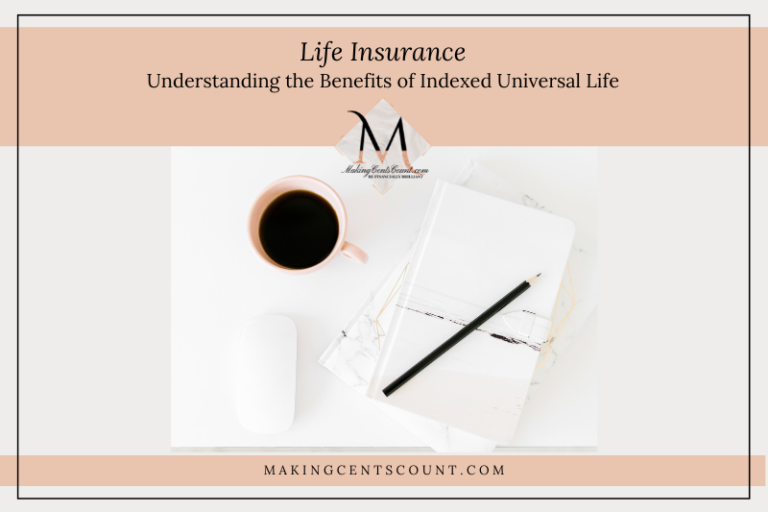Inflation-Proof Your Investments: Mastering the Effects of Inflation
Estimated reading time: 16 minutes
Inflation-proofing your investments is essential for protecting your nest egg from the erosive effects of rising prices. Investing in inflation-proof securities such as real estate investment trusts (REITs), long-dated bonds, and fixed-rate certificates of deposit can provide a hedge against inflationary pressures. By understanding the underlying causes and effects of inflation on your investments, you can make informed decisions about how best to protect yourself and your assets. Through diversifying and smartly allocating funds, you will be able to weather the storm of inflation and come out on top.
Are you ready to start investing, control your finances, and prepare for retirement? Join our amazing community! You’ll receive exclusive financial tips from Making Cents Count, as well as unlimited FREE access to our resource library full of money-saving tools and guides.
Putting Inflation Dynamics In Context
Investing in times of inflation can seem daunting, but there are several strategies that investors can employ to protect their wealth. Many investments such as commodities and real estate do well during times of inflation. Treasury Inflation-Protected Securities (TIPS) can also provide a hedge against rising prices. Investors should also consider investing in funds that target inflation-beating assets such as gold and silver to help protect their money from the erosion of purchasing power caused by inflation. Furthermore, diversifying investments across a variety of asset classes is important to maintain portfolio balance and lessen the risk of losses due to inflation.
Investors need to keep a close eye on trying to inflation-proof their investments throughout the year. Keeping an eye on market reports, reading analyst commentary, and keeping a watchful eye on economic data are all important tools for staying informed about the current state of inflation expectations. By understanding how inflation affects the market and how to best protect their investments, investors can stay prepared for any future changes in inflation that raise interest rates further.
It is also important for investors to take a longer-term outlook when it comes to inflation dynamics. As economic cycles come and go, so do inflation rates. Taking the time to understand the cycle of the inflation rate can give investors an edge in their strategies by allowing them to stay ahead of any potential shifts in the market. By doing so, investors can make smarter decisions about their investments that are based on a thorough understanding of the market’s dynamics.
Mastering the Indicators of Rising Inflation
Inflation can be a difficult situation for investors, as it is often difficult to predict what will happen and when prices will rise. To safeguard your money from inflation, consider low-risk investment options like investing in rate CDs or other investments with low risk. Investing in inflation-protected funds or other investments which are more likely to appreciate during periods of rising inflation can also be beneficial. To shape your inflation-proof investment strategy and ensure the safety of your money, it’s crucial to understand the indicators of rising inflation. With careful planning and strategic investments, you can protect your money from inflation and ensure that you remain financially secure.
Another important factor to consider when dealing with rising inflation is the impact it will have on your living costs. Prices paid for everyday goods and services are likely to rise with inflation, so it is important to budget accordingly. Consider the possibility of reducing some of your expenses to combat rising costs. You may also need to consider increasing the amount you save each month to ensure that you are still able to maintain your lifestyle and not lose out in the long term.
While it is important to be mindful of rising inflation, it is equally important to stay informed and monitor your financial situation. Pay attention to economic news and indicators, including the Consumer Price Index (CPI) and Producer Price Index (PPI). The CPI measures the price of consumer goods and services across the economy, while PPI measures input costs to producers. Both indices can give insight into the state of inflation and help you make more informed financial decisions.
Floating-Rate Bonds
With floating-rate bonds, the interest rate fluctuates in tandem with market conditions. These bonds, also known as variable-rate bonds, are classified as a type of debt security. This means that the coupon rate paid to the bondholder rises or falls as interest rates in the underlying market fluctuate. At predetermined intervals (such as quarterly), the coupon rate – or stated rate of return – resets in line with prevailing market rates. This provides the bondholder with a degree of protection from inflation and rising interest rates, as their coupon payments will rise along with the market rate.
Governments, financial institutions, and corporations usually issue these bonds.The floating-rate structure gives issuers the ability to adjust coupon payments according to market conditions raising interest rates, making them more attractive to investors. Floating-rate bonds can be a suitable investment for people who want to benefit from potential increases in interest rates without taking on the risk of investing in long-term bonds. As interest rates increase and market rates rise, the coupon payments on a floating-rate bond will also grow. This can provide investors with a steady income and the ability to benefit from rising rates.
Floating-Rate Bond Maturities
Issuers typically offer floating-rate bonds in increments of $1,000 or more, with maturities typically ranging from three to five years. This bond structure affords investors a degree of flexibility and the possibility for higher returns. These bonds carry less risk than fixed-rate bonds since the coupon rate adjusts based on market conditions. Floating-rate bonds can be a great option for investors who have a short-term investment strategy and want to take advantage of changing interest rates.
Furthermore, floating-rate bonds can be attractive investments for investors who want to diversify their portfolios. Floating-rate bonds can help to reduce overall risk since they are less dependent on long-term market changes. Floating-rate bonds’ rate of return usually fluctuates with short-term interest rates. As a result, the bond’s price doesn’t change substantially due to rising or falling rates. This makes them a great choice for investors looking to minimize risk while still enjoying some of the benefits of higher yields.
As a bonus, the interest payments on floating-rate bonds are usually higher than those of other fixed-income securities, making them a great option for investors looking to maximize their returns. Floating-rate bonds are a great way to diversify your portfolio and reduce risk, while still providing you with attractive returns. Investing in floating-rate bonds is an excellent way to hedge against uncertain times and preserve capital.
Inflation-Proof Your Investments: Effect of Inflation on Stocks
Inflation can have a major effect on stocks, bonds, and other investments. When inflation is high, it often causes the value of stocks to go down as investors become more cautious about putting their money into riskier investments.
Inflation can up consumer prices and also hurt corporate earnings, as companies are usually unable to increase prices at the same rate that inflation is rising. This may cause stock prices to decline due to lower earnings.
In summary, inflation can have both positive and negative effects on stocks. On the one hand, investors may buy into REITs as a hedge against inflation, while on the other hand, higher inflation can negatively affect corporate earnings and lead to a decrease in stock prices.
Ultimately, investors should understand how different economic conditions could potentially affect their investments. To make informed investment decisions, investors must stay up-to-date with the current inflation rate and consider currency risks that may affect their stock portfolios.
Inflation-Proof Your Investments: Effect of Inflation on Fixed Income Investments
Investing in index funds, ETFs, REITs, and other asset classes can be a good way for investors to take advantage of rising prices due to inflation. Investors should look for investments that have the potential to generate returns higher than the rate of inflation, therefore, allowing you to inflation-proof your investments. These may include long-dated bonds, and real estate investment trusts (REITs), Inflation can have serious consequences for investors.
It’s important to understand the impact it can have on investments and to consider strategies to protect your portfolio from inflation hedge its effects. There are some simple steps you can take to hedge against inflation through investing.
Firstly, investors should investigate funds with the potential to beat inflation and generate returns that exceed the rate of inflation. Investors may want to look for investments that offer higher yields such as long-dated bonds or REITs, which have the potential to generate above-market returns.
Hedging Your Investments to Be Inflation-Proof
Diversifying your portfolio with investments not correlated to inflation can help you hedge against its effects on other investments. These could include stocks or commodities such precious metals such as gold and silver. Commodities tend to rise when inflation pressures increase, making them a good way to offset the risks associated with fixed-income investments.
Ultimately, the best way to protect against inflation is to invest for the long term with an appropriate asset allocation that takes into account your risk tolerance and financial goals. While no one can predict future inflation levels, by taking a proactive approach to managing your investments you can minimize its effects and ensure your savings stay ahead of the game.
In many cases, fixed-income investments provide the best protection against inflation as they offer a predictable, steady stream of income that can help offset the negative effects. Depending on your particular situation, it may be beneficial to include both short-term and long-term bonds in your investment portfolio. Inflation-proofing your investments is further facilitated by doing so. Short-term bonds will respond quickly when inflation rises, while long-term bonds provide a steady stream of income over an extended period.
Investment Options That Thrive in an Inflationary Environment
In addition to bonds, you may also consider investing in stocks and real estate as part of a diversified portfolio. While these investments are more volatile than fixed-income investments, they can benefit from rising prices due to inflation. Over the long term, stocks and real estate investments may provide a higher return than fixed-income investments.
Finally, it’s important to remember that inflation can have an impact on all of your investments. To mitigate the risks associated with inflation, it’s important to monitor the markets closely and adjust your asset allocation as needed. This will ensure that you maximize your returns while minimizing the risks associated with inflation. With proper planning and an understanding of how inflation affects investments, you can ensure that your portfolio remains resilient in a changing economic landscape.
Real Estate Investment Trusts (REITs)
Investors seeking inflation-proof investments often opt for Real Estate Investment Trusts (REITs). With its attractive benefits, REITs has established itself as a leading preference among investors.. REITs allow you to invest in real estate without having to purchase and manage physical properties. By investing in properties such as retail centers, office buildings, storage facilities, or apartment complexes, investors can benefit from the appreciation of the property as well as any income generated from rental payments.
Investors consider REITs as a safeguard against inflation since they can hold their value amidst the negative impact of high inflation on money. This is because REITs have a consistent dividend payment and their prices tend to rise relative to inflation, which means you can maintain your purchasing power even in times of high inflation.
In addition to being inflation-proof, REITs also allow you to diversify your portfolio, as they provide an additional way to invest in real estate without having to purchase and manage physical properties themselves. Investing in REITs with diverse property types reduces the risk from specific sectors, regions, or property types.
Why REITs Are Seen as a Hedge Against Inflation
Real Estate Investment Trusts (REITs) can deliver better returns than conventional stocks and bonds. They pay higher dividends, resulting in stronger overall returns. REITs can safeguard against inflation since their income is associated with property taxes and rental prices that increase during inflationary periods. As a result, REIT value often rises with inflation and this is their benefit. This makes investing in REITs an excellent way to ensure investments remain largely unaffected by rising costs of living.
Many REITs have diversified portfolios that reduce investor risk and protect against market fluctuations. REITs offer an inflation-proof investment option, with potential for higher returns over time. Careful selection and research make REITs a great way to protect your finances against inflation.
Long-Dated Bonds
Investors who seek protection against inflation oftentimes rely on long-dated bonds. Long-term maturities of these bonds tie up investors’ money, making them a proven remedy against inflation. Consequently, shielding against inflation and offering better protection from price increases. This keeps investments safe from market shifts and secures a stable yield even in times of high inflation.
In addition, these bonds are usually issued with higher coupon rates than shorter-term bonds. This means that investors will earn more interest on their investments over time, helping to offset the effects of inflation.
Another great feature of long-dated bonds is that they pay out semi-annually or annually rather than monthly or quarterly.
Inflation-Proof Your Investments Value: The Erosive Effects of Inflation
Long-dated bonds are an excellent way to protect your investments from the effects of inflation. High yielding and lower risk, bonds preserve the value of your money over the long run. Locking in an interest rate protects your investments from inflation caused by rising rates. Investing in long-term bonds is a great way to keep your savings secure for years to come.
In addition, long-dated bonds can be an effective way to hedge against inflation. Bonds are less impacted by inflation since their interest rates are locked for the bond’s life. This makes them a great choice if you’re looking for an inflation-proof investment.
How to Inflation-Proof Your Long-Dated Bond Investments
Finally, long-dated bonds can be a great way to diversify your portfolio. These investments offer stability for those wanting to diversify their portfolio, with no ties to volatile or emerging markets. With long-dated bonds, you can rest assured that your money is secure and protected from the effects of inflation.
Overall, long-dated bonds can be an excellent way to protect your investments against inflation. With a fixed interest rate for the bond’s life, you can rest assured that your money stays safe against inflation. Additionally, by diversifying your portfolio with long-dated bonds, you can lessen the risk of any sudden, market price fluctuations.
So if you are interested in an inflation-proof investment option, then long-dated bonds may be the right choice for you. A long-dated bond offers security and peace of mind as it protects against inflation risks. Investing in long-dated bonds offers a secure and steady return on investment, protected from future inflationary pressures.
Treasury Inflation-Protected Securities (TIPS)
These bonds are issued by the U.S. government and are designed to protect investors from inflation by tying their principal value to the rate of inflation. As bond prices increase, so do returns, making them great for insulating against inflation’s effects.
TIPS pay a fixed interest rate semi-annually and have a principal value that increases with inflation, measured by CPI. When the bond matures, investors receive either the adjusted principal or the original principal, whichever is greater.
Overall, TIPS are an excellent way to hedge against inflation and maintain the purchasing power of your money. While not as profitable as other investments, they offer inflation protection that many find invaluable.
Inflation-Proof No Matter What Happens to the Economy
Investing in TIPS guarantees inflation-proof savings, regardless of any economics-related eventualities. Like any investment, research and risk evaluation are imperative before investing a significant amount of money. Be sure to consult with a financial professional to determine if TIPS is right for you.
Treasury Inflation-Protected Securities (TIPS) are an inflation-proof way to safeguard investments from unpredictable inflation rate changes.
Is There a Way for Investors to Take Advantage of Rising Prices?
Absolutely! Investors in the commodities market can benefit from price increases and protect their portfolios against inflation using long-term strategies.
Commodities
Commodities are another inflation-proof investment strategy. Such as gold, silver, and oil have historically been viewed as safe havens during times when prices are rising. Investing in these types of assets can help hedge against inflationary pressures while providing a potential for capital appreciation.
Similarly, gold, silver, and oil are other commodities that remain largely unaffected by inflationary pressures. Gold, a stable commodity in times of economic uncertainty, has been a trusted store of wealth for centuries. Silver’s valued for its role as an important industrial metal, while oil’s much sought-after as an indispensable energy source. Together, they make for strategic investments. Investing in these commodities can provide a hedge against inflation as their prices generally tend to increase alongside rising inflation.
Lastly, gold, silver, and oil are all proven ways to protect assets from the effects of inflation. Historically, during economic turmoil, precious metals have served as astute investments. They’re easy to store and manage and are ideal in mitigating inflation. Augmenting gold, silver, or oil into your profile acts as a safeguard against the rising cost of living.
Inflation-proof investing can be a great way for investors to protect their money and take advantage of rising prices. Adding inflation-protected investments like TIPS, real estate, or commodities to portfolios can defend investors’ assets from inflation’s long-term effects.
Long-Dated Fixed-Rate CDs
Long-Dated Fixed-Rate CDs are an example of inflation-proof investment and one that is often overlooked by investors. This investment-grade CD type offers a fixed rate for a number of years, unaffected by inflation. Interest earned on the CD won’t change with rising prices, keeping your money safe and secure.
The locked-in interest rate at the start of a term can buffer against inflation from rising prices. Long-Dated Fixed-Rate CDs protect investments from inflation, as long as funds aren’t needed during the fixed rate period.
Inflation-proof CDs offer secure investment options with higher interest rates compared to other CD types. This makes them deal for secure investments that provide optimal returns.
Long-Dated Fixed-Rate CDs are an excellent way to protect your money from inflation, while still receiving competitive interest rates. So, if you’re looking for an inflation-proof investment option, consider Long-Dated Fixed-Rate CDs!
Are CDs a Good Hedge Against Inflation?
In short, yes! Long-Dated Fixed-Rate CDs offer higher interest rates than most investments, making them a great hedge against inflation. This means that your money’s purchasing power will be maintained even in times of rising inflation. Fixed investment products like CDs provide more predictable returns than volatile investments such as stocks.
Inflation impacts everyone, but it can be especially harmful for investors relying on investments for retirement or long-term goals. It’s important to protect your investments from inflation’s effects by ensuring their long-term value.
Burhoe Insurance Solutions
The first step to ensuring you have the right strategies in place is crucial. It could mean the difference between having the income to live the lifestyle you want or, simply, not having enough. Contact Burhoe Insurance Solutions. We can help you understand the various products available to meet your unique needs.
If working on your finances is one of your goals right now (or, maybe it’s been a goal for some time), I suggest starting with the Making Cents Count Financial Organizer.
Our financial organizer is the robust answer you need. The organizer is our DIY financial services option, providing you with the tools to eliminate financial overwhelm.
In the exclusive Making Cents Count Financial Organizer, you’ll get:
- Clear strategies to get your finances under control
- Processes to organize and streamline your investments
- Guidance to track your legal documents, tax information, and permanent records
- Markers to know when you should meet with an attorney to establish a will or trust
- Templates, checklists, and step-by-step actions
- Insights on the financial-must haves to build a secure future
- Detailed How-To Guide for optimal results
If you want financial confidence, grab the Financial Organizer, and get results that fit *your* lifestyle!
Making Cents Count Financial Organizer
Once you get your budget rolling, check out my post on 6 Simple Steps to Get Financially Organized. This post also includes a helpful checklist available in my Resource Library (free to access).
Admittedly, this particular checklist has a larger-scale focus on your overall financial picture, but I genuinely feel that getting your finances organized is essential.
I’m so excited to invite you to join our Financial Success Society Waitlist! Our enrollment opens soon (so don’t miss a chance to get on the notification list). Your journey to financial success is unique and with this exclusive membership, you’ll receive the guidance you desire, enabling you to move financially forward, no matter where you are in your financial journey. At Making Cents Count, we offer an array of outstanding products and services to help you get control of your finances so they won’t control you!







